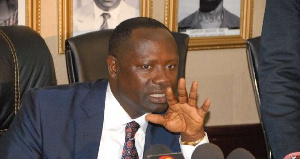Business News of Friday, 24 February 2017
Source: thebftonline.com
Kofi Buah fears privatization of VRA, GRIDCO
Former Petroleum Minister, Emmanuel Armah Kofi Buah, says he fears the Volta River Authority (VRA) and the Ghana Grid Company Limited (GRIDCo) may end up being privatised, following government’s intention to explore ways of listing the power utilities on the local bourse as part of a national electricity master plan.
President Nana Addo Dankwa Akufo-Addo is his maiden State of the Nation Address told the 275-member Parliament that: “As at the end of 2016, the Electricity Company of Ghana (ECG) had signed 43 Power Purchase Agreements (PPA), whilst a further 23 were under discussion. Government is conducting a review of all the Power Agreements entered into by the previous government in order to prioritise, renegotiate, defer or cancel outright, if necessary, in the national interest.
Overall, we have begun to develop a national electricity master plan, which will also explore the benefits of listing VRA and GRIDCO on the Stock Exchange.”
However, reacting to the President’s comments, Mr. Buah told the B&FT that “The President talked about listing VRA and GRIDCO. I pray and hope those are not cold words for privatisation of these very critical assets.”
He also explained that these public institutions are already owned by Ghanaians. “These public institutions, if it is about listing them in a way to raise funds from the ordinary people of Ghana, is already owned by Ghanaians and it will stay like that. But I hope we are not going to look for some white man to come and buy 50 percent of the shares.”
Power providers, Volta River Authority (VRA), GRIDCo and the Electricity Company of Ghana (ECG) is saddled with US$2.4billion debt.
The World Bank in 2013, diagnosed Ghana’s energy sector as performing below expectation and called on the government to fix the problems in the sector as a path to ensuring that the country’s economic growth and ambition are not stymied by a lack of electricity.
The Bank blamed successive governments for their inability to solve the problems within the nation’s energy sector.
The challenges, the bank said, were a lack of adequate and secure quantities of reasonably priced fuel for power generation, and the lack of adequate public funds to finance the sector’s investment requirements.
The challenges, according to the World Bank, were exacerbated by the poor technical and financial performance of the Electricity Company of Ghana (ECG) and the Volta River Authority (VRA), and policies and practices that seriously damaged the financial health of ECG, VRA and the Ghana Grid Company Limited (GRIDCo).











